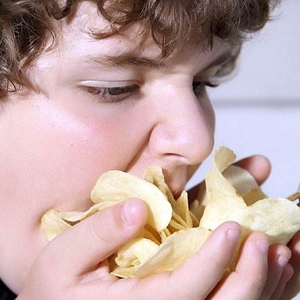Finally! A smart phone (or computer) app that actually does something constructive and healthy! Okay, there may be others that do things other than tell you how to order the latest special from your fave Fast Food joint… But this one actually trains you to choose better foods and lose weight!
 The FoodT app might help teens and kids, especially, learn to
The FoodT app might help teens and kids, especially, learn to
choose less junk food and, incidentally, lose weight.
Researchers at the Universities of Exeter, in the UK, and Helsinki, in Finland, have come up with a ‘brain training app’ designed to help folks ‘learn’ to eat less junk food and, in the process, lose weight.
What they did
According to an abstract of the report on the app’s performance: “The Food Trainer (FoodT) app trains people to tap on images of healthy foods – but to stop when they see unhealthy snacks, creating an association between these foods and stopping. […] About half of the study’s 1,234 participants followed the recommendation and played the game at least 10 times.”
Researchers rated junk food consumption on an eight-point scale, ranging from four or more items per day, to one or zero items per month.
What they found
Playing the game at least once a day over a month led to an average reduction of junk food consumption by one point – which translated to an average weight loss of about 0.5 kg, or one pound. Subjects who played the app more often reported larger changes in their junk food intake. (And, we assume, greater weight loss; though the abstract does not say so explicitly.)
“As an example, someone who ate each junk food two to four times a week reduced this to once a week after using the app regularly for a month,” says Professor Natalia Lawrence, of Exeter. “We would expect to see this, because the app targets mechanisms that lead people to become overweight, such as the strong urges to approach and consume tempting junk foods.”
The takeaway
“Overall, the findings are really encouraging,” Lawrence observes. “The app is free and it only takes about four minutes per day — so it’s something people realistically can do — and our results suggest it is effective. There’s some evidence that the benefits were stronger for people who were more overweight.”
Dr. Matthias Aulbach, of the University of Helsinki, added: “For anyone with unhealthy eating habits – perhaps developed during lock down – FoodT might be helpful.”
My take
I can see how this approach would work – at least for some people. But the motivation to lose weight would have to be there, already, among users for the system to be effective. You’d have to want to lose weight and, therefore, want to play the game. So, FoodT is obviously not for folks who either don’t care about their weight, or can’t get along emotionally without regular infusions of junk food.
I think, too, that this approach might be really helpful in changing the eating habits of teens and kids who eat too much junk food and need to lose some weight. Spending time on their computers or smart phones seems to have evolved into the number-one pastime for kids across the developed world. If they want to lose weight, they should be motivated to play the app. And, once they see some results, they may be further motivated to keep using it. Another motivator for kids is money. You can’t ‘do’ anything without it. If they ‘learn’ to eat (and buy) less junk food, they’ll find they have more money in their pockets for other things.
As for losing extra pounds / kg gained during the sedentary months of COVID-19 lock down, I think most folks will return to their normal eating habits and levels of activity once the masks come off for good and the world’s daily routines return to normal. That should result, naturally, in the loss of some (or, hopefully, all) of any extra weight packed on over the past 15 months.
~ Maggie J.

